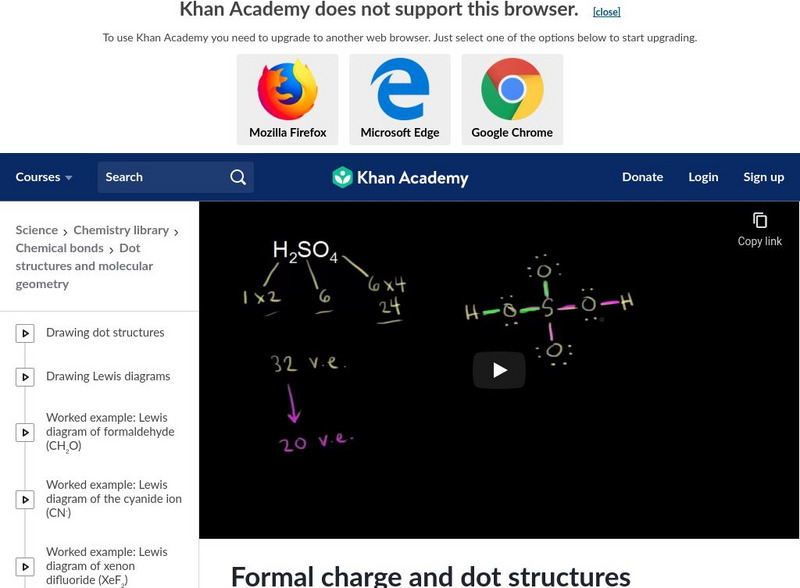Berkeley University of California
Ionic Bonding
This instructional video explains how bonds are formed between different atoms. It discusses valence electrons, charges, electron transfer, and Coulomb attraction. It is the second in a 15-part series.
Berkeley University of California
Lewis Electron Dot Structures
You think all of the good periodic table jokes argon? I don't zinc so! Video discusses electron dot structures based on valence electrons. It highlights the arrangement of the periodic table and the stability of the noble gasses. This is...
Berkeley University of California
Octet Rule
What did sodium say to chloride? You complete me! The video goes over the octet rule for bonding. It introduces the concept of double and triple bonds and references the electron dot structure and valence electrons. Video is the...
Crash Course
Bonding Models and Lewis Structures
Atomic models help us visualize the interactions of substances we cannot see. Explore atomic models, specifically Lewis structures, that show valence electrons and their role in bonds.
Educreations
Lewis Dot Structures
What may look like a bunch of dots is actually complex science! Gilbert Lewis' work is important for understanding molecular chemistry, and his approach is great for visual learners. The video describes the process of drawing a Lewis dot...
Educreations
Electron Configuration Example
What does an atom look like? The instructor in a tutorial video models how to use the periodic table to determine the number of subatomic particles. He then uses the number of electrons to create an orbital diagram. Finally, Groves...
Educreations
Valence Electrons and Ionic Bonds (Advanced)
Build on your scholars' basic understanding of valence electrons by showing them how to use valence electrons to predict formations of ionic bonds. The informative video includes an explanation of how lattice energy attributes...
Ricochet Science
Structure of an Atom
Just because we can't see an atom doesn't mean we can't study it! The video examines the makeup of the atom. It explains the roles of the protons, neutrons, and electrons.
Educreations
The Aufbau Hotel
A simple analogy helps to explain a complicated concept in this instructional chemistry video. After first listening to a description of a hotel with different types of rooms on different floors, each with its own...
TED-Ed
Schrödinger's Cat: A Thought Experiment in Quantum Mechanics
Can something be both alive and dead at the same time? According to quantum physicist Erwin Schrödinger, the answer is yes. Watch this short video to learn how the wave and particle nature of all matter allows objects to be in two states...
Curated OER
Valence Electrons and Forming Ions
Cute manga style animated Aya is your host for this short but good explanation of valence electrons and forming ions. She explains how to know whether to add or subtract electrons when ions are forming. Note: The voice work is a little...
Khan Academy
Representing Structures of Organic Molecules, Biology
Sal starts this video by looking at a traditional chain of carbons and working through the different ways they can be diagrammed.
Khan Academy
Khan Academy: Groups of the Periodic Table
An explanation of groups on the Periodic Table and their characteristics. [8:19]
Khan Academy
Khan Academy: Counting Valence Electrons for Main Group Elements
Learn how the group number relates to the number of valence electrons in the main group elements on the Periodic Table. [8:18]
Khan Academy
Khan Academy: Ionic, Covalent, and Metallic Bonds
An introduction to different types of chemical bonds.
Khan Academy
Khan Academy: Drawing Dot Structures
Introduction to drawing positions of electrons in Lewis Dot Structures. [14:42]
Khan Academy
Khan Academy: Formal Charge and Dot Structures
An introduction of formal charge and how it may affect the stabilization of dot structures. [11:30]
Khan Academy
Khan Academy: Vsepr for 2 Electron Clouds
An introduction of VSEPR and molecules with 2 electron clouds. [8:04]
Khan Academy
Khan Academy: Vsepr for 3 Electron Clouds
A description of VSEPR with 3 electron clouds and various types of molecules. [12:33]
Khan Academy
Khan Academy: Chemistry: Valence Electrons
Using information about electron configuration to determine elements react with other elements. [15:23]
Khan Academy
Khan Academy: Chemistry: Groups of the Periodic Table
An explanation of the families, or groups, of the periodic table. [11:51]
Khan Academy
Khan Academy: Chemistry: Periodic Table Trends: Ionization Energy
The energy to remove an electron, or ionization energy, is explained. [12:13]
Sophia Learning
Sophia: Identifying Valence Electrons: Lesson 1
This lesson will explain how to identify the number of valence electrons an element has based on its position on the periodic table. It is 1 of 3 in the series titled "Identifying Valence Electrons."
Sophia Learning
Sophia: Writing Electron Configurations: Lesson 1
This lesson will demonstrate how to write the electron configurations for any element given its location on the periodic table. It is 1 of 3 in the series titled "Writing Electron Configurations."























